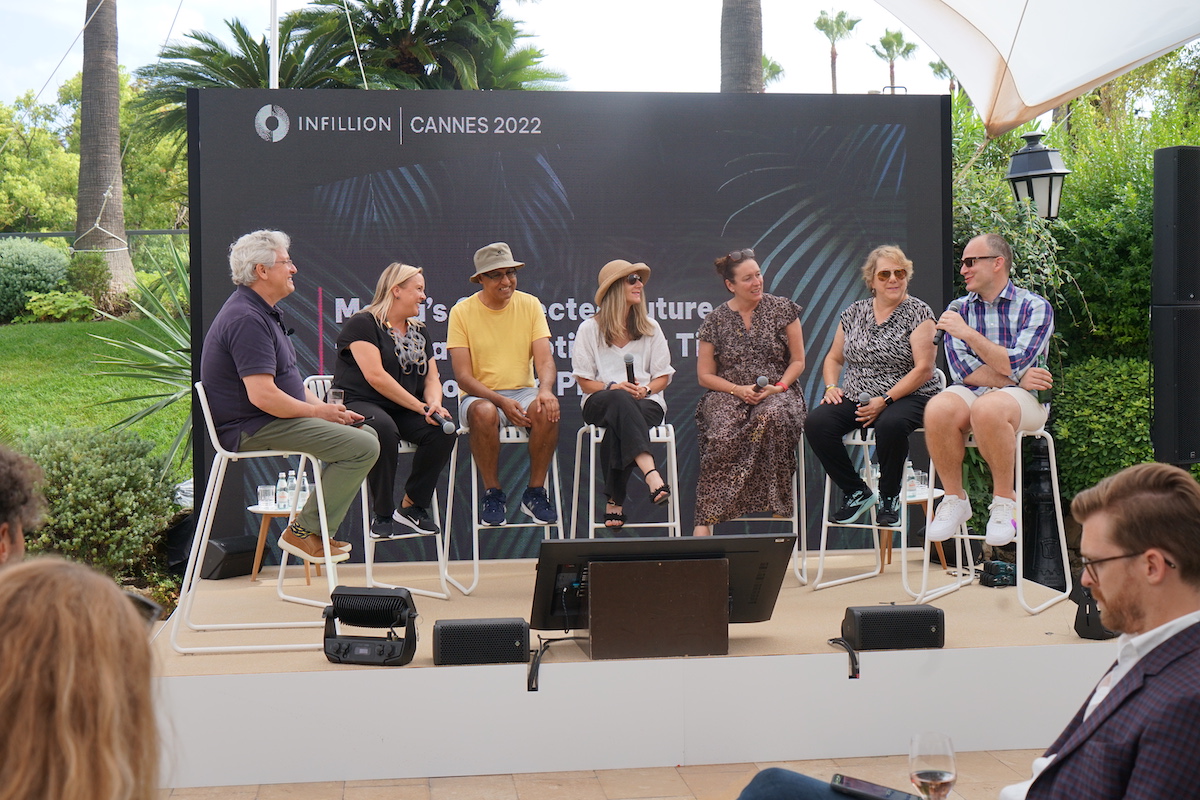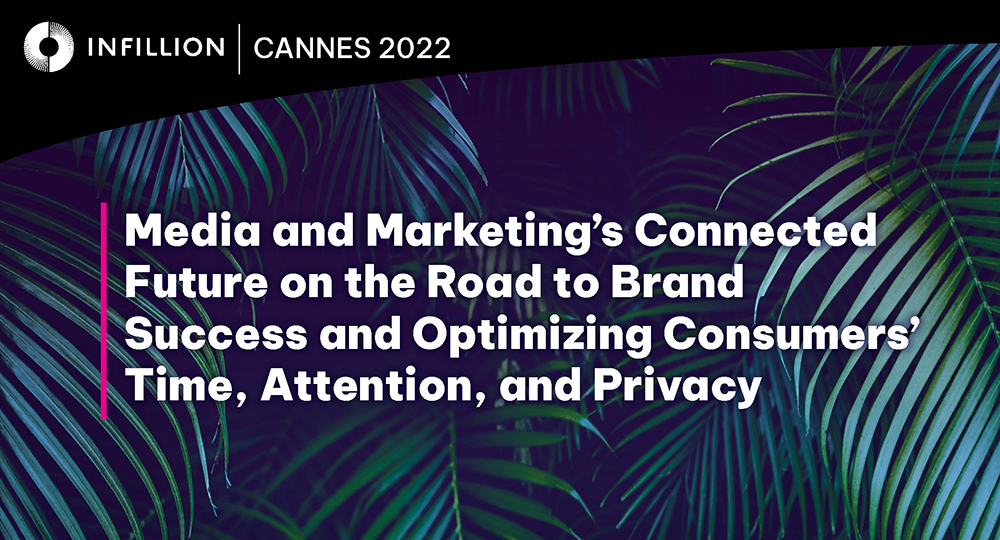What will media look like in the consumer-driven future? We gathered the industry’s market-makers at Cannes Lions to answer this question. This panel of experts included moderator Michael Burgi, Senior Editor of Digiday; Christa Carone, President of Infillion Media; Sheryl Goldstein, EVP & Chief Industry Growth Officer at IAB; Sophie Kelly, Sr. VP at Diageo; Doug Rozen, CEO of dentsu Media, Americas; Jatinder Singh, Global Head of Data & Analytics at Accenture Song; and Antonia Wade, Global Chief Marketing Officer at PwC.
The panel tackled some of the biggest topics in Cannes—everything from representation and purpose, to the attention economy to the future of the media industry at-large.
The Rise of Representation and B2B Marketing
Antonia Wade was eager to share her take on inclusion and the root of what’s driving a groundswell of focus on representation. Wade remarked, “84% of the world’s population is not white, not male, not able-bodied. And you look at Nike talking and how much revenue they attribute to the black community and how they are giving back. At PWC, we are thinking about how we ‘live our purpose’ through the work, through advertising and media.”
As the CMO of PWC, who invests heavily in B2B marketing, Wade appreciated the fact that the CEO of LinkedIn made a strong case for how important B2B marketing is for the bottom line for every organization. “B2B marketers deserve great creative. I appreciated him for that because it’s a perennial problem in B2B to get really amazing, gifted agencies working on your account and doing their best work.”
Doug Rozen, who counts LinkedIn as a major client at Dentsu, suggested that B2B work has never been as sought because the work focuses mostly on lower funnel performance drivers. Rozen was certain that “the B2B category is now going to raise the bar to really push creativity in the space and hopefully drive more attention and opportunity around B2B marketing as 2022 is the inaugural year for Cannes B2B Creative Lion.”
The Convergence Between Advertising and Marketing Solutions
Michael Burgi directed the conversation to industry convergence. Burgi remarked that despite numerous conversations around Cannes Lions the industry seems to remain very siloed. Burgi challenged the group to identify places where interconnectivity is happening.
Some said they were seeing convergence between advertising solutions and marketing solutions “Some of our meetings were with chief product officers for major brands who are more focused on the consumer experience, especially in ways to apply data that not only informs media, but is actually informing the outputs relative to consumer experiences,” remarked Christa Carone. “And it’s actually one of the reasons that Infillion exists,to define those converging points between technology, solutions and services that are authenticated through human connections. It was very reassuring that this festival is starting to shift, not just from celebrating the creativity, but also the ways that creativity is inspiring and informing broader consumer experiences.”

Jatainder Singh suggested that every major stakeholder in an organization be accountable to a single metric, one ROI. He believes that people exhibit the behaviors for which they’re compensated and that one goal would be a way to force convergence. “I think if we all have that common goal and it goes across all of these different interconnected ecosystems, we all work towards the greater good, we can all learn from one another, and there’s obviously great synergies as a result of doing that. So we’re seeing a lot of that as well,” said Singh.
Sheryl Goldstein, added from the IAB’s perspective that membership has changed dramatically. There are now chief privacy officers, legal and policy people in addition to the traditional marketing, digital and media roles at the table. Goldstein said, “When we do our annual leadership meeting now, you cannot believe the variety of personalities and roles that are now coming to learn about what’s happening in digital, what’s happening on the policy front, what’s happening with privacy.”
One area where we are not seeing as much convergence, as much progress is on the buy side according to Doug Rozen.” I think there’s still too much one-upmanship going on. Where each holding company, each agency is trying to do their own thing to solve bigger worldly problems, be it around attention metrics, be it around measurement. We need to be more radically collaborating on the buy side to match what the sell side is doing on their side. And think of it not as like an arms race, but a call to arms, to some extent, to come together to solve some of these bigger problems.”
The Broken Measurement of Attention
Rozen raised one of the most pressing topics in media circles right now—attention. The panel unanimously agreed that the emergence of digital, particularly programmatic media, attention is the broken measurement in media. One of the things Rozen and his Dentsu colleagues have been pushing for is a shift away from “the faulty way of measuring attention, which is currently impression based.” Rozen acknowledges that viewability doesn’t mean you had true attention…or engagement in an ad. He went on to say “How do you create an open economy around attention? How do you understand what that metric is? We’ve been doing work over the last four years to codify what that is, in partnership with a whole host of partners to create this kind of open way of thinking about attention and ultimately trading on attention.”
Sheryl Goldstein aptly stated that stakeholders need to be willing to share data, “and I don’t see people that willing to share data yet”. The panel furthered the need for the call to arms with the impending elimination of third party cookies and convergence that will dictate more cooperation around first party data.
Web3.0 Will Be User-Defined
As the panel wound down, these experts anxiously addressed web3.0 and how quickly (or slowly) adoption of the new interactive future will come. Sophie Kelly suggested that “as soon as people stop being intimidated by the tech and the lack of audience in it, and start to think about platforms like gaming, and how people are immersed in those worlds, and how the behaviors work in those worlds, and the interaction works in their world, then we’re going to start to see real acceleration in it. I also think as soon as we get the user infrastructure working better so that more people can understand how to integrate into blockchain, we’re going to see a massive acceleration, the same way we did with social media.”
Doug Rozen predicted that “the next seven years will be the year of the multiverse.” Michael Burgi chided Rozen “The multiverse, that’s a Marvel cinematic universe, right?” Rozen suggested that the multiverse means that in the near future consumers will never exist in one reality and that, ultimately, consumers will want to transact in the environment that offers the best customer experience at any point in time. In the end, the panelists agreed that the future is customer-defined and that attention, the metaverse and the future of creativity will be driven by users—with tremendous amounts of technology available to them—who will also be determining the industry’s fate.
Carone closed the session by emphasizing everyone’s opportunity to accelerate the creation of the technologies, services and solutions that truly respect consumers’ time, attention, and privacy.
Follow Infillion for Cannes Lions 2022 Recaps
Want more Cannes Lions 2022 content? This is one of the four panels that we’ll be sharing, so make sure to follow Infillion on Linkedin and Twitter.
Check out our other panel recaps:

